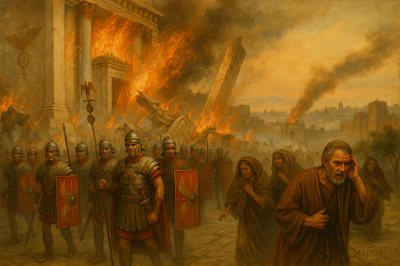We get this question a lot, especially when people first hear about partial preterism, and usually, they bring up Matthew 24:21, where Jesus said:
“There will be great distress, unequaled from the beginning of the world until now—and never to be equaled again.”
That’s a strong statement, right? So the usual follow-up is:
“But how can that be? There have been way worse disasters and persecutions after AD 70, like the Holocaust, World War II, or even the persecution of Christians in other countries. Doesn’t that disprove what you’re saying?”
It’s a fair question! But here’s our simple, no-stress answer:
Jesus wasn’t talking about body count. He was talking about covenant judgment.
Let’s break that down into bite-sized pieces:
1. Jesus wasn’t describing just any disaster—He was pointing to the end of the Old Covenant age.
If you go back and read the whole chapter of Matthew 24, Jesus is talking about the destruction of the temple (v.2) and the judgment on Jerusalem. This wasn’t just another war. It was a massive turning point in redemptive history—the final judgment on the Old Covenant system.
That meant:
-
No more sacrifices.
-
No more Levitical priesthood.
-
No more temple.
That entire system was shut down. Boom. Done.
That’s what made it a “never-to-be-repeated” moment. Not because it was the bloodiest, but because it had the biggest theological impact. No other event in world history had that kind of spiritual weight.
2. “Worst ever” doesn’t always mean most people died—it means most covenantally significant.
We’re not denying that there have been worse disasters in terms of death toll. We agree—terrible things have happened in history. But AD 70 wasn’t just about suffering—it was about meaning.
The Old Testament (especially Deuteronomy 28) warned that if Israel broke their covenant with God, a terrifying judgment would come. And in AD 70, it did—exactly as Jesus said it would.
Roman armies surrounded Jerusalem, just like in Luke 21:20. The city was crushed. The temple burned. The sacrificial system was erased.
For the Jewish people under the Old Covenant, that was the end of their world.
3. The phrase “never to be equaled again” is covenantal, not just global.
People often assume Jesus was talking about the whole planet when He said “unequaled distress.” But the Bible often uses this kind of language in a local or covenant-specific way.
Check this out:
-
Exodus 11:6 says there would be a wailing in Egypt “worse than there has ever been or will be again.” That didn’t mean all time and all nations—it meant Egypt.
-
Daniel 12:1 says there will be “a time of distress” unlike anything before, for Israel, not the whole globe.
So when Jesus said, “never to be equaled again,” He wasn’t talking about every war or tragedy across the ages. He meant: this is the final covenant judgment on Old Covenant Israel. That fits the context perfectly.
4. So, no—it doesn’t disprove partial preterism. It actually supports it.
If anything, the events of AD 70 confirm what Jesus said. It was:
-
Sudden
-
Final
-
Prophetic
-
Covenant-ending
That’s exactly what partial preterism teaches—that Jesus’ prophecies were fulfilled in His generation (just like Matthew 24:34 says), and that AD 70 marked the close of an era in redemptive history.
This isn’t about minimizing future hope—we still believe Jesus will physically return one day! But we also believe He kept His word about that generation facing a unique, once-for-all judgment.
Conclusion: So Was AD 70 Really the Worst?
In the sense Jesus meant it—yes. It was the worst covenantal judgment in redemptive history. It was the end of the Old Covenant world. And that’s exactly what He warned about in Matthew 24.
So while it’s true that many terrible events have happened since then, none of them fulfilled that specific prophecy, and none carried the same covenantal finality.
Partial preterism helps us read the Bible in its proper historical and redemptive context. It doesn’t downplay suffering or tragedy—it simply helps us see that Jesus’ prophecy was fulfilled exactly as He said it would be.
Let’s keep reading the Bible in context, with eyes on Jesus—not just as a future hope, but as the King who’s already established His New Covenant kingdom.
For more inquiries, contact us:
Email: formeradventist.ph@gmail.com
Website: formeradventistph.blogspot.com
Facebook: https://www.facebook.com/groups/formeradventistph
Phone: 09695143944





No comments:
Post a Comment